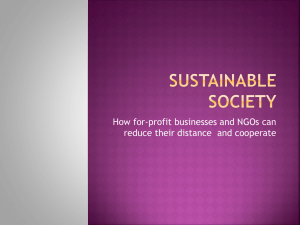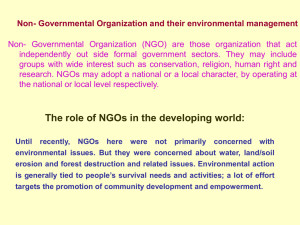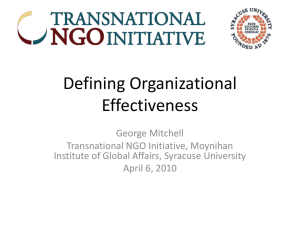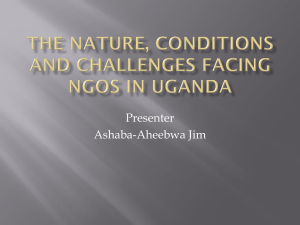Lecture for MA-students Tuesday 19 September 2006
advertisement
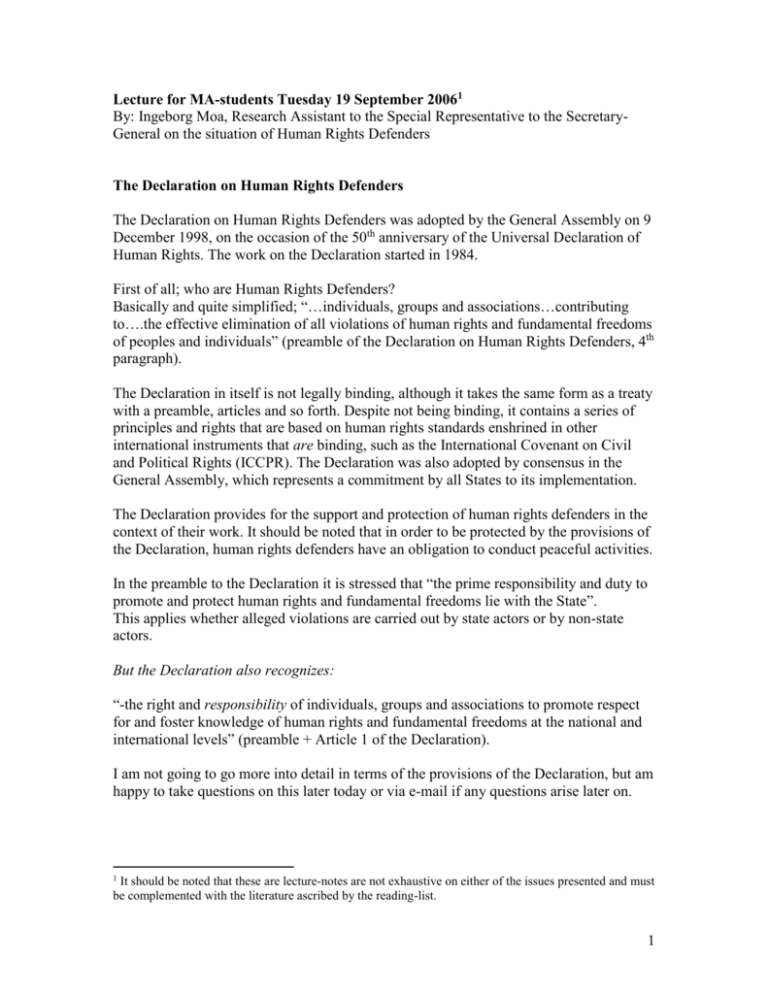
Lecture for MA-students Tuesday 19 September 20061 By: Ingeborg Moa, Research Assistant to the Special Representative to the SecretaryGeneral on the situation of Human Rights Defenders The Declaration on Human Rights Defenders The Declaration on Human Rights Defenders was adopted by the General Assembly on 9 December 1998, on the occasion of the 50th anniversary of the Universal Declaration of Human Rights. The work on the Declaration started in 1984. First of all; who are Human Rights Defenders? Basically and quite simplified; “…individuals, groups and associations…contributing to….the effective elimination of all violations of human rights and fundamental freedoms of peoples and individuals” (preamble of the Declaration on Human Rights Defenders, 4th paragraph). The Declaration in itself is not legally binding, although it takes the same form as a treaty with a preamble, articles and so forth. Despite not being binding, it contains a series of principles and rights that are based on human rights standards enshrined in other international instruments that are binding, such as the International Covenant on Civil and Political Rights (ICCPR). The Declaration was also adopted by consensus in the General Assembly, which represents a commitment by all States to its implementation. The Declaration provides for the support and protection of human rights defenders in the context of their work. It should be noted that in order to be protected by the provisions of the Declaration, human rights defenders have an obligation to conduct peaceful activities. In the preamble to the Declaration it is stressed that “the prime responsibility and duty to promote and protect human rights and fundamental freedoms lie with the State”. This applies whether alleged violations are carried out by state actors or by non-state actors. But the Declaration also recognizes: “-the right and responsibility of individuals, groups and associations to promote respect for and foster knowledge of human rights and fundamental freedoms at the national and international levels” (preamble + Article 1 of the Declaration). I am not going to go more into detail in terms of the provisions of the Declaration, but am happy to take questions on this later today or via e-mail if any questions arise later on. 1 It should be noted that these are lecture-notes are not exhaustive on either of the issues presented and must be complemented with the literature ascribed by the reading-list. 1 The mandate and work of the Special Representative of the Secretary-General on the situation of Human Rights Defenders The mandate of the Special Representative of the Secretary-General on the situation of Human Rights Defenders is given in paragraph 3 of Commission of Human Rights resolution 2000/61, and can be broken down into three main tasks: To seek, receive, examine and respond to information on the situation and the rights of anyone, acting individually or in association with others, to promote and protect human rights and fundamental freedoms. To establish cooperation and conduct dialogue with governments and other interested actors on the promotion and effective implementation of the declaration To recommend effective strategies to better protect human rights defenders and follow up on these recommendations Through which means are these tasks mainly carried out? Complaints Procedure (urgent appeals and letters of allegation) Official Country Visits (upon invitation of the State in question) Participation in regional and international conferences and events Continuous dialogue with States, NGOs, defenders and other interested actors. The Special Procedures Mechanisms These mechanisms are established upon the request of the Human Rights Council to: «examine, monitor, advice and publicly report on human rights situations in specific countries or on major human rights themes and phenomena worldwide ». The Special Representative of the Secretary-General on the situation of Human Rights Defenders is one of about 40 such mandate-holders. As one can read from the above, there are both thematic mandates and country-specific mandates. The Office of the High Commissioner for Human Rights provides these mechanisms with personnel and logistical assistance to aid them in the discharge of their mandates. Mandate holders are independent experts and are not UN employees and receive no remuneration for the work carried out in order to fulfil their mandate. The mandates of country-specific mandate-holders are brought up for renewal annually, whereas the mandates of thematic mandate holders are brought up for renewal every three years. NGOs are crucial in the work of the Special Procedures, both in providing information about violations and in providing support to the system as a whole. In terms of the mandate of the SRSG, NGOs are the “raison d’etre” of the mandate of the Special Representative. NGO-participation in the UN human rights system; Consultative status with ECOSOC and subsidiary bodies is somehow the entry level for any meaningful NGO participation at the international level. Only through consultative 2 status, NGOs are able to do more than provide information to influence the workings of the UN human rights system. Which NGOs are given consultative status, is decided by the Committee on NonGovernmental Organizations in New York. At present, more than 2,700 NGOs have consultative status with ECOSOC and its subsidiary bodies. At the moment, the Committee on Non-Governmental Organizations is composed of these member-states of the UN: Cameroon, Chile, China, Colombia, Cote D’Ivoire, Cuba, France, Germany, India, Iran, Pakistan, Peru, Romania, Russian Federation, Senegal, Sudan, Turkey, U.S.A., and Zimbabwe. The accreditation process has been criticized for being costly and resource intensive, and for governments’ abilities to block and grant applications on the basis of political interest. There are 3 types of consultative status; General consultative status (e.g. Amnesty International, CARE International, MSF, Muslim World League) Special consultative status (e.g. International Federation of Journalists, Landmine Survivors Network, Norwegian Refugee Council, Norwegian Peoples’ Aid) NGOs on the roster (e.g. WHO, ILO, International Water Association) All NGOs in consultative status can provide written statements. In theory, only NGOs in the two first categories can make oral statements at meetings, but in practice at the Commission of Human Rights, little distinction has been made between the three categories in terms of speaking rights, according to the ISHR’s “A new chapter for Human Rights”. (p. 90) NGOs in the two first categories can designate authorized representatives to attend public meetings of ECOSOC and its subsidiary bodies. NGOs in the third category can designate representatives to attend meetings related to their area of work. NGOs in general consultative status can also propose items for the drafting of provisional agendas of ECOSOC and its subsidiary bodies, but this is rarely done. In addition to participation directly in Council meetings, the NGOs also organize socalled “parallel events” or “shadow events” when the Council or subsidiary bodies are in session. Treaty Bodies It is important to point out that this is a bit on the side of the subject of consultative status, but I still would like to mention the issue of NGO-interaction with the treaty bodies. Any NGO working within the field of the human rights contained in each treaty can interact with treaty bodies. NGOs are usually not required to be in consultative status with ECOSOC in order to work with treaty bodies. 3 NGOs can work with treaty bodies by: Promoting the ratification of a treaty Monitoring compliance by States parties with the reporting obligations Submitting written information and material, including in an NGO report (for some treaty bodies) participating in the session of the treaty bodies as observers of through NGO oral submissions Follow up on the concluding observations of treaty bodies (for some treaty bodies) submitting individual complaints (for some treaty bodies) providing information to help confidential inquiries (for CERD) providing information for early warning and urgent procedures making submissions to the annual meeting of chairpersons Challenges in relation to NGO participation Some challenges for NGOs in cooperation with the UN human rights system: The membership and decision-making process of the NGO Committee. GONGOs (Governmental Non-Governmental Organizations). Expensive for NGOs, in particular those from developing countries, to travel to and stay in Geneva during the sessions. Large number of NGOs gives short speaking-time for each NGO. Excluding social movements without sufficient organizational structure. In general unclear situation in terms of what will happen in relation to consultative status and NGO participation now with the new Human Rights Council. -END- 4






